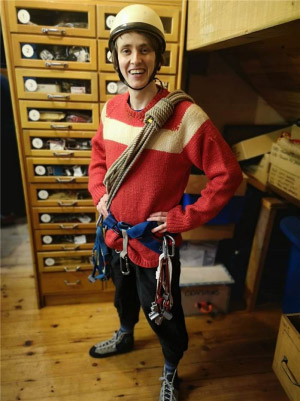
Calum McBain
How did you get involved in climbing?
I first got into climbing when I went to my friend’s birthday party at the Glasgow Climbing Centre when I was 9. I went in and out of climbing for the next few years until I went to university, where I got really into climbing, especially outside and I was really involved with my unviersity mountaineering club. After university I continued working at climbing walls and as a freelance coach as I really enjoyed the work and the flexibility it gave to go climbing myself.
Where do you climb the most?
If i’m honest probably indoors mostly! Although whenever the weather is good I try to make the most of it and get to the more remote parts of Scotland, my favourite place is anywhere in the North West or the Hebrides. When time allows I also regularly like to escape to the sunny crags of Spain, whether thats bouldering in Albaraccin or cranking hard in Siurana.
How did you get involved in climbing?
I first got into climbing when I went to my friend’s birthday party at the Glasgow Climbing Centre when I was 9. I went in and out of climbing for the next few years until I went to university, where I got really into climbing, especially outside and I was really involved with my unviersity mountaineering club. After university I continued working at climbing walls and as a freelance coach as I really enjoyed the work and the flexibility it gave to go climbing myself.
What is your favourite type of climbing?
I think trad climbing will always be my favourite, especially on big wild sea cliffs. Scotland just such a huge amount of high quality, varied trad routes, from the remote sea cliffs of Pabbay and Mingulay, to the big remote mountain crags like the Shelterstone.
Where do you climb the most?
If i’m honest probably indoors mostly! Although whenever the weather is good I try to make the most of it and get to the more remote parts of Scotland, my favourite place is anywhere in the North West or the Hebrides. When time allows I also regularly like to escape to the sunny crags of Spain, whether thats bouldering in Albaraccin or cranking hard in Siurana.
What other interests do you have?
I enjoy hill running and particularly enjoy trying to combine this with climbing, whether thats trying to do a fast Cuillin ridge traverse or enchain several different climbs together by running between them.
